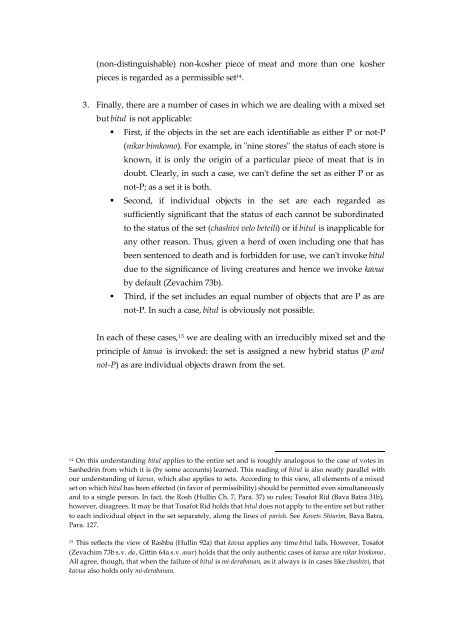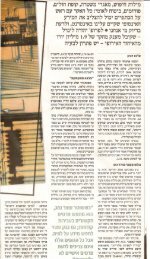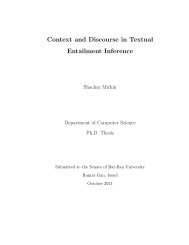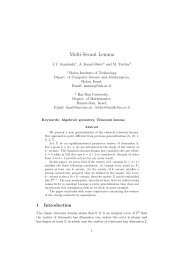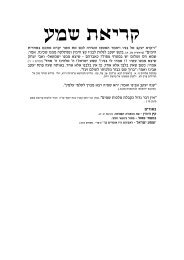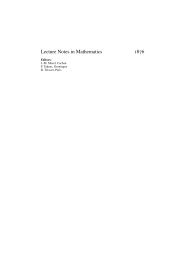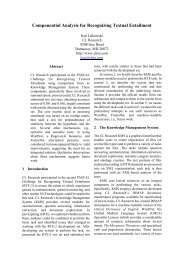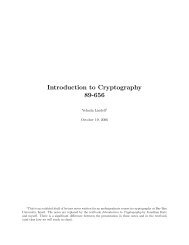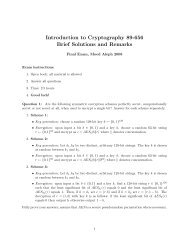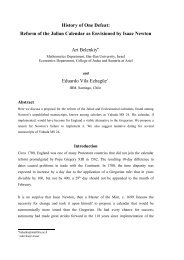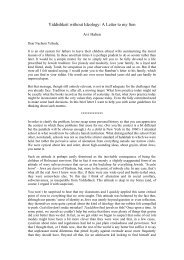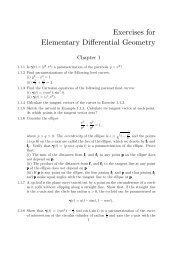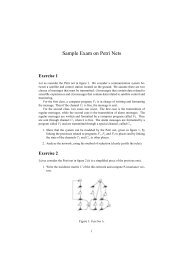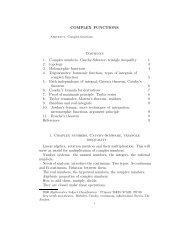Resolving Uncertainty: A Unified Overview of Rabbinic Methods
Resolving Uncertainty: A Unified Overview of Rabbinic Methods
Resolving Uncertainty: A Unified Overview of Rabbinic Methods
Create successful ePaper yourself
Turn your PDF publications into a flip-book with our unique Google optimized e-Paper software.
(non-distinguishable) non-kosher piece <strong>of</strong> meat and more than one kosher<br />
pieces is regarded as a permissible set 14 .<br />
3. Finally, there are a number <strong>of</strong> cases in which we are dealing with a mixed set<br />
but bitul is not applicable:<br />
• First, if the objects in the set are each identifiable as either P or not-P<br />
(nikar bimkomo). For example, in "nine stores" the status <strong>of</strong> each store is<br />
known, it is only the origin <strong>of</strong> a particular piece <strong>of</strong> meat that is in<br />
doubt. Clearly, in such a case, we can't define the set as either P or as<br />
not-P; as a set it is both.<br />
• Second, if individual objects in the set are each regarded as<br />
sufficiently significant that the status <strong>of</strong> each cannot be subordinated<br />
to the status <strong>of</strong> the set (chashivi velo beteili) or if bitul is inapplicable for<br />
any other reason. Thus, given a herd <strong>of</strong> oxen including one that has<br />
been sentenced to death and is forbidden for use, we can't invoke bitul<br />
due to the significance <strong>of</strong> living creatures and hence we invoke kavua<br />
by default (Zevachim 73b).<br />
• Third, if the set includes an equal number <strong>of</strong> objects that are P as are<br />
not-P. In such a case, bitul is obviously not possible.<br />
In each <strong>of</strong> these cases, 15 we are dealing with an irreducibly mixed set and the<br />
principle <strong>of</strong> kavua is invoked: the set is assigned a new hybrid status (P and<br />
not-P) as are individual objects drawn from the set.<br />
14<br />
On this understanding bitul applies to the entire set and is roughly analogous to the case <strong>of</strong> votes in<br />
Sanhedrin from which it is (by some accounts) learned. This reading <strong>of</strong> bitul is also neatly parallel with<br />
our understanding <strong>of</strong> kavua, which also applies to sets. According to this view, all elements <strong>of</strong> a mixed<br />
set on which bitul has been effected (in favor <strong>of</strong> permissibility) should be permitted even simultaneously<br />
and to a single person. In fact, the Rosh (Hullin Ch. 7, Para. 37) so rules; Tosafot Rid (Bava Batra 31b),<br />
however, disagrees. It may be that Tosafot Rid holds that bitul does not apply to the entire set but rather<br />
to each individual object in the set separately, along the lines <strong>of</strong> parish. See Kovets Shiurim, Bava Batra,<br />
Para. 127.<br />
15<br />
This reflects the view <strong>of</strong> Rashba (Hullin 92a) that kavua applies any time bitul fails. However, Tosafot<br />
(Zevachim 73b s.v. ela , Gittin 64a s.v. asur) holds that the only authentic cases <strong>of</strong> kavua are nikar bimkomo.<br />
All agree, though, that when the failure <strong>of</strong> bitul is mi-derabanan, as it always is in cases like chashivi, that<br />
kavua also holds only mi-derabanan.


